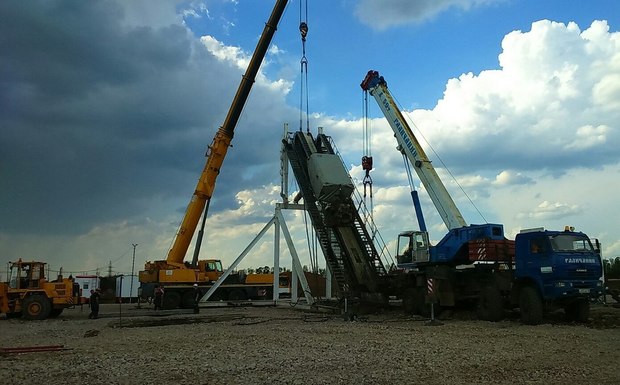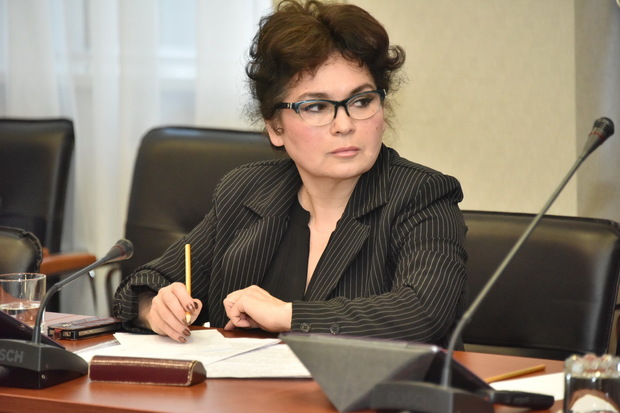Ecologists: consequences of high-viscosity oil production impossible to forecast
The environmentalists are sounding the alarm that people may remain without water due to the extraction of high-viscosity bitumen oil
Environmental impacts of the massive subsoil use on the territory of Tatarstan are hard to assess. At a recent meeting of the Committee on ecology, nature management, agricultural and food policy, the correspondent of Realnoe Vremya became a witness of that ecologists chided the oil companies for 'lagging' level of APG utilization among the small oil companies and warned the management of Tatneft about the likelihood of a loss of underground sources of drinking water in the area of production of high-viscosity oil at Ashalchinskoye field.
The discussion of the impact of oil production on the environment looked more like a pre-consultation meeting rather than a detailed discussion on environmental issues. During the work of the meeting of the Committee on ecology, nature management, agricultural and food policy on the compliance with environmental legislation in the field of protection of atmospheric air, land, and water bodies in the area of oil production, there was no overall assessment of the ecological condition in the south-east. Although the deputies highlighted the key problem areas of the oil-producing region, they said nothing about the size of an ecological compensation.
Will the springs survive after oil production?
The chairperson of the Committee Takhir Khadeyev focused on the longstanding issue of Zakamye region — the quality of drinking water extracted from underground sources. 'In the process of oil production in order to maintain pore pressure, a significant amount of highly mineralized groundwater (brines) and purified waste waters are pumped,' he began. 'Imperfect and faulty downhole equipment may cause ingress of brines in aquifers.'
Continuous injection into underground bowels of the process liquid upsets the hydrological balance, which means that it is unknown whether pure springs will remain on this land. Maybe it's time to include them in the Red List? Most importantly, it is unclear whether scientists study the condition of the land after a massive oil drilling? Continuing on the theme, Takhir Khadeyev said that already now people have begun to feel the deterioration of drinking water quality. According to him, the residents of the settlement of Elkhovo in the Almetyevsk district have turned to him with similar complaints for several times. 'After considering the results of inspections, it was established a non-compliance of the quality of drinking water to the hygienic requirements on sanitary-chemical indicators, the content of hydrogen sulphide,' he added. Hydrogen sulphide is the strongest poison inevitably released during oil production.

The oil production also has a poisoning effect on the air. Deputy head of the department of Rosprirodnadzor in the Republic of Tatarstan Liliya Gainutdinova stated that the problem of air pollution is still relevant for the south-east of the Republic because the problem of utilization of associated petroleum gas (APG) has not been solved yet. It is still burned in flares, although in 2012 the federal government obliged all oil companies to transfer to a 95% utilization of APG. It turned out that only Tatneft has achieved this threshold but other small oil companies' indices have risen only to a 74% utilization, and they continue to pay fines.
Deputy head of Rosprirodnadzor in the Republic of Tatarstan did not name what environmental damage is being caused on the south-east. According to her, today only three small oil companies, including Transoil, SNP-Neftegaz, Druzhbaneft renamed as Elect, have carried out works on reconstruction of infrastructure for APG utilization. 'Now they have achieved utilization of more than 95% of APG,' said Gainutdinova. Thus, the estimates that by 2012 the Republic will provide a 95% utilization rate failed to materialize.
Capstone made Tattekh to pay fines
However, 100% utilization of APG is breaking down for purely technical reasons. Tattekh CJSC, founded 25 years ago with participation of American Texoil, Inc. was forced to remove the most powerful turbine Capstone Turbine Corporation on utilization of associated petroleum gas with a capacity of 1,6 MW this summer. In 2011, it was promoted for a widespread application in small oil companies, however, a 'weak link' in this turned out to be the 'nozzles' that constantly 'burnt down'. As a result, the level of APG utilization amounted to 37% instead of 95%, and the company received the technical conditions for implementation of APG utilization at Tatneft.
'These turbines have been installed for utilization during the extraction of oil from Onbiyskoye field, which had some infrastructure,' First Deputy Director General of Tattekh CJSC, the chief engineer Yevgeny Veriya told Realnoe Vremya. 'Our expenses amounted to 120 million rubles. Now a lawsuit with the supplier, a division of the BPC ENGINEERING, which is the exclusive distributor of Capstone in Russia, CIS and the Baltic states, is underway. We had to pay a fine for the removal of the plant.'

How Ashalchiskoye field has been 'steamed'
The main claim of the ecologists to Tatneft is connected with the development of Ashalchinskoye field, where the production of high-viscosity oil is performed at shallow depths. It is here the underground sources of water lie. For many years, Tatneft has used an unconventional method — the steam-assisted gravity drainage, i.e. the oil is pumped not under the influence of water but the pressure of high-temperature steam.
As Liliya Gainutdinova stated, now the question is the protection of drinking water from pollution, because 'natural bitumen of the Sheshminskiy horizon are at depths from 48 to 124 meters on the borders of fresh and mineralized waters located close to settlements'.
'The specifics of the extraction of high-viscosity oil is different from the traditional one, and we cannot predict to what consequences the impact of high-temperature steam can lead. In the case if the impacts appear, the settlements may remain without drinking water sources, and the recovery will be long,' she warned.
The ecologists do not propose to abolish this technology but they insist on the introduction of the monitor of groundwater sources with the help of 'an intermediate monitoring well within the radius of influence of injection wells to protect.'

'This concern has been expressed by the citizens living nearby,' told Liliya Gainutdinova to the deputies. 'That is why we have sent a claim addressed to Director General of Tatneft to take corresponding measures. Perhaps, they will solve this issue,' she expressed hope. Thus, the supervising body do not scare the oil companies with 'bogeyman stories' but, at the same time, they also do not strongly insist. So, a natural apocalypse is not expected.